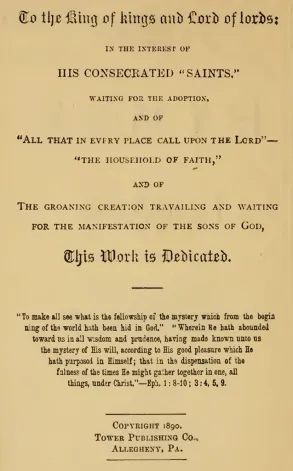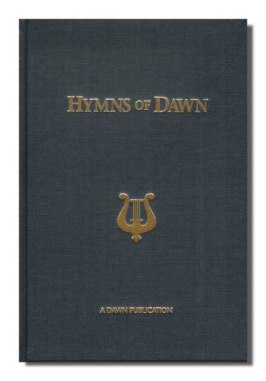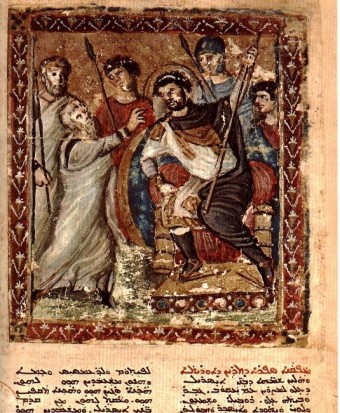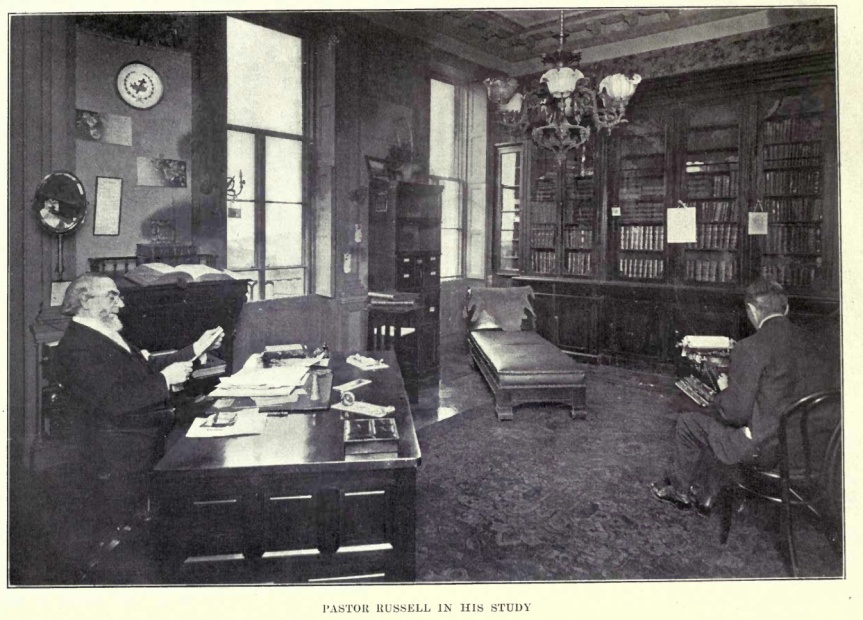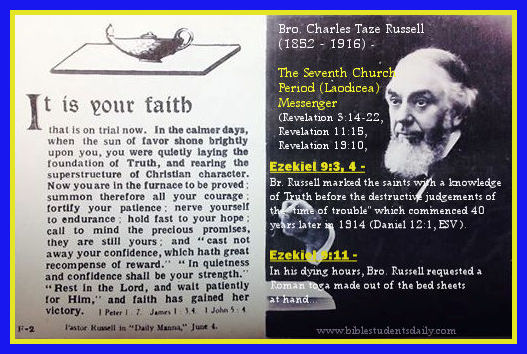Dawning Day – Hymns of Dawn No. 29
“(1) Come, let us shout joyfully to Jehovah! Let us shout in triumph to our Rock of salvation. (2) Let us come into his presence with thanksgiving; Let us sing and shout in triumph to him” (Psalm 95:1,2).
“My mouth shall praise Thee with joyful lips” (Psalm 63:5).
“Until the day break, and the shadows flee away, I will get me to the mountain of myrrh, and to the hill of frankincense” (Song of Solomon 4:6).
Note: “ ‘Myrrh’ is bitter experience and the wisdom gained through such experience. ‘Frankincense’ represents praise and thanksgiving. Hymns of praise often include the Christian’s gratitude for deliverance from suffering that is beyond human endurance. Such help usually evokes praise and thanksgiving. Of course pleasant experiences also bring forth praise, but the type of praise that arises from suffering is on a higher level than praise from pleasure. Verse 6 alludes to praise that arises from suffering.
‘Until … the shadows flee away.’ The shadows of the nighttime experience of the Church will ‘flee away’ when the Church is complete. These are the shadows of the gospel night, the Passover night. Why is myrrh a ‘mountain’ and frankincense a ‘hill’? Two different Hebrew words are used. Our praise can never reach the mark of perfection. What Jesus offered at Calvary far transcends anything we can offer” (Br. F. Shallieu, Notes on the Song of Solomon, pages 37-38).
Here is a recording of Hymn No. 29 from the “Hymns of Dawn” to aid God’s people in singing and making melody in their hearts unto God.
Bible Scriptures Associated With This Hymn
Deuteronomy 1:21 (KJV) — “Behold, the Lord thy God hath set the land before thee: go up and possess it, as the Lord God of thy fathers hath said unto thee; fear not, neither be discouraged.”
Deuteronomy 31:6 (ESV) — “(6) Be strong and courageous. Do not fear or be in dread of them, for it is the Lord your God who goes with you. He will not leave you or forsake you.”
Romans 2:7 (ESV) — “to those who by patience in well-doing seek for glory and honor and immortality, he will give eternal life;”
Romans 13:12 (NAS) — “(12) The night is almost gone, and the day is near. Therefore let us lay aside the deeds of darkness and put on the armor of light.”
Colossians 1:27 (KJV) — “(27) To whom God would make known what is the riches of the glory of this mystery among the Gentiles; which is Christ in you, the hope of glory.”
Lyrics
1.
Christian, the morn breaks sweetly o’er thee,
And all the midnight shadows flee;
Tinged are the distant skies with glory,
A beacon light hangs out for thee.
Arise! arise! the light breaks o’er thee,
Bright from thy everlasting home;
Soon shalt thou reach thy goal of glory,
Soon shalt thou share thy Saviour’s throne.
2.
Lift up thy head; the day breaks o’er thee;
Bright is the promised shining way!
Light from heav’n is streaming for thee;
Lo! ’tis the dawn of perfect day.
Rejoice! rejoice! in hope of glory,
Counting all else but vanity:
Precious this truth; O seek and hold it,
And send it forth that all may see.
——-
The History Of This Hymn
Original Author — Joseph Rusling (1788-1839)
Composer — no information.
*******
The words below are based on content from Reprint No.5769-5770 of the Original Watch Tower and Herald of Christ’s Kingdom as documented in the Harvest Truth Data Base: http://www.htdb.one
THE ARMOR OVER THE ROBE
We are to put on the “armor of light.” Consider the light you have now received—the light of the knowledge of God, of His will, of what to live for, and of what kind of characters they are to whom the Lord will be pleased to grant the reward of eternal life, even the highest form of life. Having all this knowledge, put it on as an armor to protect you. Knowing what God requires, put all this on, not as a robe, but as an armor over the robe. Put on the breastplate of righteousness covering the heart. Realize that nothing but heart-purity and absolute loyalty to God may be considered. Realize that God is for us. Take the Sword of the Spirit, the Word of God, and all the various pieces enumerated by the Apostle. These constitute the “armor of light,” so called because it is obtained from the light of Truth.
In this our day it is surely as important that we should put on this armor and should put off the works of darkness as for the Church of the Apostle’s day. Surely if ever the whole armor was needed, it is needed now. The Lord’s dealing with us is individual—both as to the putting off of the works of darkness and as to the putting on of the armor of light. All who put on this armor will find themselves in accord with the Lord and with those who are truly His. As God’s faithful children get farther and farther into this Day of the Lord, more and more will they see eye to eye. We believe there never was a time when so many of the Lord’s people have seen eye to eye regarding the things to put off and the things to put on. We believe there never was a time when so many of the children of the light were wearing the whole Armor of Light. Therefore we have so much the more responsibility to “walk as children of light” and not as of the night.
DANGER TO EVEN THE FULLY CONSECRATED
It is possible that some, even of the fully consecrated children of God, surrounded with the cares of this life, or weary of the struggle against sin and evil, or somewhat beguiled by the present things of time and sense, may have become more or less drowsy, and so stand in special need of the stirring exhortation which the Apostle in this connection gives to the Church—particularly appropriate today: “It is now high time to awake out of sleep!” It is time for earnest, searching self-examination, for a more diligent watching to see that we do not allow the things of this “present evil world” to absorb our thoughts and energies to the imperiling of our Heavenly hopes, so soon to be realized if we remain wholly faithful to the end. It is highly important that we seek for a still closer walk with God, a more intimate fellowship with Him, a more thorough self-abnegation, a more diligent cross-bearing, a more faithful conformity in every respect to the whole will of the Lord concerning us. And this will of the Lord, we know, is not unreasonable, and His grace sufficient is promised for every day, every hour, every moment!
A careful, prayerful searching of our hearts will make plain wherein we lack in conformity to the perfect will of God. And if we discover in ourselves any perverse way, we shall correct it. Thus we more and more “put on the Lord Jesus Christ”—the mind or disposition of Christ, the spirit of love and loyalty which characterized Him. How important it is, in the very short time which yet remains to us, that we fully awake and apply ourselves most diligently to the cultivation of the Godlike, Christlike disposition of Love, the love which seeks above all else the glory of God, which is kindly-affectioned toward the brethren, which rests in the precious promises, which trusts fully in the dark as well as in the light, and which has no shadow of doubt that all the good things promised in God’s Word shall be fulfilled!
LET US “WALK AS BECOMETH SAINTS”
In the context St. Paul urges, “Let us walk honestly, as in the day.” He was speaking of certain vile practises then common—drunkenness, rioting, chambering, wantonness. We are not necessarily to suppose that he meant this as a reproof to the Christian believers at Rome, but as a pastoral exhortation that they should be on guard against these sins, and as a reminder that the principles which they had adopted as Christians were in direct contrast to those which generally prevailed. Very different standards of morality were current among the heathen. Quite a large number of the believers at Rome had been heathen and accustomed to immoralities. Hence the Apostle’s words were words of caution; for we would not suppose that saints would be guilty of these things.
The Apostle’s words above shed a warning light in saying, “Let us walk honestly, as in the day.” Most of the rioting and drunkenness is done at night—such is the custom even to this day. Works of darkness and sin thrive best at night, for some reason. People have other things to attend to in the day-time, and evil-doers take the night for frivolity or carousing or crime. Vice then stalks abroad. Darkness seems to favor such works, by hiding them more or less. The Apostle points out that this is the great night of darkness, sin, but that those in Christ are not in darkness; for they have been brought into the light of God. We are looking for the full dawning of the Morning of the New Dispensation—we are seeking to live in harmony with it. So here he says, Let us walk honestly, above-board, so that everybody will see and know our lives—let us be honest in every way, not be preaching one thing and practising another.
Considering the day here mentioned to be the Millennial Day, we may well say that nothing in the nature of sin will then be allowed. “For out of Zion shall go forth the Law, and the Word of the Lord from Jerusalem.” (Micah 4:2.) “Judgment also will I lay to the line,” says Jehovah, “and righteousness to the plummet; and the hail shall sweep away the refuge of lies, and the water shall overflow the hiding-place.” (Isaiah 28:17.) Whoever in that Day shall attempt to live riotously and in drunkenness or in any sin will be promptly punished. The Apostle’s exhortation is that we, as saints of the Lord, should live as those will be living when the Day shall have fully come—when the Sun of Righteousness will be shedding its beams over the whole earth.
It is a part of our overcoming to live as though the Day were fully ushered in, as though everything had been fully manifested. Whoever will take the Apostle’s advice in this matter will certainly have a rich blessing. In fact any other course would be sure to be disastrous to us as New Creatures in Christ!
ONLY A LITTLE WHILE
“Only a little while to walk with weary feet,
Only a little while the storms of life to meet,
Only a little while to tread the thorny way,
Only a little while, then comes the perfect Day.
“Only a little while to spread the truth abroad.
Only a little while to testify for God,
Only a little while, the time is fleeting fast,
Only a little while, earth’s sorrows all are past.
“Only a little while, then let us do our best,
Only a little while, then comes the promised rest.
Only a little while, oh, what a word is this!
Only a little while, then comes the perfect bliss.”
====================
My Saviour — Christ Jesus
Here are some free online articles in relation to the Heavenly Father — Jehovah, and his Son — Christ Jesus — “a ransom FOR ALL … to be testified in due time” (1 Timothy 2:6), as well as, about the holy Spirit (the invisible power and influence of God) with clear explanations about why the anti-Christ teaching of “the trinity” — introduced by the Roman Catholic Church system (the “Beast” in the Book of Revelation) — is not what the Bible teaches. The Bible Student Movement does not support the teaching of purgatory nor does it support the Roman Catholic System’s teaching about people being sent to a place where they burn up forever, which certainly does not reflect the perfect love of God — the Almighty Creator of all things.
Hence, for the interested Reader, we urge you to consider the following articles and posts:
The Doctrine of the Trinity – Mystery or Confusion by Br. David Rice.
http://www.heraldmag.org/1999/99nd_3.htm
The Origin of the Trinity – From Paganism To Constantine by Sr. Cher-El L. Hagensick.
http://www.heraldmag.org/olb/Contents/doctrine/The%20Origin%20of%20the%20Trinity.htm
Facts About the Trinity
http://www.heraldmag.org/olb/contents/doctrine/FACTS%20ABOUT%20THE%20TRINITY.htm
God and the Trinities
http://www.heraldmag.org/literature/doc_42.htm
Development of the “Trinity Doctrine” by Br. Tom Gilbert.
http://www.beautiesofthetruth.org/Archive/Library/Doctrine/Mags/Bot/90s/2010d.pdf
Understanding John 1:1 by Br. Richard Doctor.
http://www.beautiesofthetruth.org/Archive/Library/Doctrine/Mags/Bot/90s/2010d.pdf
Father, Son and Holy Spirit
https://biblestudentsdaily.com/2016/06/23/father-son-and-holy-spirit/
What Is the Heavenly Father’s Name
https://biblestudentsdaily.com/2017/06/27/gods-name-what-is-the-heavenly-fathers-name-that-we-are-to-hallow-and-why/
Jesus – The Name
https://biblestudentsdaily.com/2017/07/05/jesus-the-name/
The Doctrine of Christ – Booklet
http://www.biblestudents.com/docs/DoctrineChrist.pdf
Hymn Book Purchase
The Hymns Of Dawn (hymn book) can be purchased at:
The Chicago Bible Students Online Bookstore: https://chicagobible.org/product-category/books/page/4/
The Dawn Bible Students Association: http://www.dawnbible.com/dawnpub.htm
Acknowledgment & References

Br. Charles Russell—the founder of the Bible Students movement, who is the compiler of “Poems and Hymns of Millennial Dawn” which was published in Allegheny, Pa., in 1890. This Bible Students’ devotional originally contained a total of 151 poems and 333 hymns.
The following prefatory to the 1905 publication of Hymns of Millennial Dawn may be of historical interest to many of our readers.
We published in 1890, with several more recent editions, a volume entitled “Poems and Hymns of Millennial Dawn” without music. The same collection of hymns with the music is now urgently needed, and therefore appears in this volume. The poems, although highly prized, are omitted for greater convenience in size. We have preserved the same alphabetical order, because so many of our readers have the older book; and where a different tune is given from that originally suggested the latter is indicated by Alt. for alternative tune, with the number where that tune can be found.
Both words and music are credited to the same class to whom the work is dedicated-to the Lord and His faithful people, “the Saints.” The authors of many of the best of them are unknown to us, and, besides, slight changes have been made in the phraseology and sentiment of quite a number, which we could not be sure their original authors would approve, and to give personal credit to less than one half would seem invidious. To all of these dear “Saints” of all ages we therefore give united and hearty thanks for the blessings which they, as the Lord’s servants and handmaidens, have bestowed upon their fellow-members of “the Church of the Firstborn, whose names are written in Heaven.” Most of them died long ago: their abundant reward will be of the Lord in the resurrection.
That the collection is thoroughly undenominational, unsectarian, will be manifest to those recognizing the fact that it includes the choicest old hymns and tunes used by all denominations.
Although we have gathered far and near and winnowed carefully we cannot hope to have gotten all the golden grains, though we do hope that no chaff can be found. The collection is for the Church, for “believers” “reconciled,” and hence contains none of the “sinners” hymns, such as “Come, ye sinners poor and needy,” because willful sinners are in no sense members of the “Body” of Christ, nor are those who have not yet accepted the Lord as their Savior.
Those who will feel the deepest interest in this collection, and whose sentiments will be most fully voiced in its verses, will undoubtedly be those in fullest degree of sympathy with the divine plan of the ages, as set forth in the several volumes of Millennial Dawn – the eyes of whose understanding have been opened to the clearer, purer light now shining from our great Redeemer’s cross, showing the fulness and the completeness of his salvation.
In fact, this volume, while not numbered as one of the volumes of the Millennial Dawn series, is designed to be a companion volume, a melodious accompaniment to the “new song,” “the song of Moses and the Lamb” (the grand harmony of the Law and the Gospel), as presented in the regular Dawn series.
Let the music of God’s good and great plan ring through your hearts and lives, dear fellow-pilgrims and fellow members of the “royal priesthood,” so that every day and every hour shall be filled with joy and praise and thankfulness! And that this little volume may assist in deepening the work of grace in your hearts is our hope and prayer.
– Watch Tower Bible and Tract Society, July, 1905, Allegheny, PA, USA
Later on, the hymns from this book formed a basis for the hymnal titled “Hymns of Dawn” which was published by the Dawn Bible Students Association in East Rutherford, New Jersey (USA) and the 1999 edition contains a total of 361 hymns.
- Harvest Truth Data Base: http://www.htdb.one
- Hymnary.org
Suggested Further Reading
“Harvest Timing Clarifications” — Br. George Tabac’s, 2016 Bible Students’ General Convention Discourse — https://www.youtube.com/watch?v=Yqa_GT2QSVA
Click on the following link to download Br. George Tabac’s 2016 Script Version of “Harvest Timing Clarifications” — https://biblestudents1.files.wordpress.com/2018/07/harvest-timing-clarifications-7-9-2016-general-convention-34-page-han.pdf
[Note: Br. George Tabac’s 2016 discourse is almost identical but not the same as his 2015 discourse where it had been concluded that 6000 years from Adams creation would be up in 2042. However later, like Br. Charles Taze Russell, Br. George too came to realize the need to clarify his understanding by one year in his 2016 General Convention discourse, where he concluded the 6000 years from creation would be up in 2043, which concurs with Br. David Rice’s chronology (www.2043ad.com). Note the distinction in the final charts of these two discourses.]
Worthy To Be Praised
https://biblestudentsdaily.com/2016/05/15/worthy-to-be-praised/
DANIEL 3:17 – Our God Whom We Serve Is Able To Deliver Us
https://biblestudentsdaily.com/2017/10/14/daniel-317-our-god-whom-we-serve-is-able-to-deliver-us/
The Lord Is My Shepherd, (R.1396) — Reprints of the Original Watch Tower and Herald of Christ’s Presence.
The Lord Is My Shepherd, (R.3268) — Reprints of the Original Watch Tower and Herald of Christ’s Presence.
Acts 23:6—HOPE & RESURRECTION. Part A: What is Jesus All About?
https://biblestudentsdaily.com/2016/11/03/acts-236-hope-resurrection-part-a-what-is-jesus-all-about/
Who We Are. BIBLE Students DAILY – https://biblestudentsdaily.com/category/who-we-are/
Reference Below:- PEOPLES PULPIT ASSOCIATION, BROOKLYN, N.Y., U.S.A. COPYRIGHT, 1917.
PASTOR RUSSELL is known the world around as the most celebrated preacher of modern times. When a young man of about twenty years of age he began to preach the Gospel of Christ Jesus, and continued faithfully to do so until his death, October 31, 1916. His explanatory writings on the Bible are far more extensive than the combined writings of St. Paul, St. John, Arius, Waldo, Wycliffe and Martin Luther—the six Messengers to the Church who preceded him. His sermons and other writings have been translated into many languages and are read appreciatively everywhere.
All Christian people will concede that St. Paul was the greatest of the Apostles of Jesus Christ. He was the Apostle who averred to the Church of his day, “I have not shunned to declare to you all the counsel of God.” (#Ac 20:27.) St. Paul’s greatness was due to the fact that the Lord used him most wonderfully to enlighten others concerning God’s great Plan of Salvation for mankind. Since the days of the Apostle Paul there have been other great reformers in the world, other great exponents of the Scriptures. But when the history of the Church of Christ is fully written, it will be found that the place next to St. Paul in the gallery of fame as an expounder of the Gospel of the great Master will be occupied by CHARLES TAZE RUSSELL.
In the first three chapters of the Revelation we are informed that to the Gospel Church have been sent seven special Messengers. Of these St. Paul was the first, and Pastor Russell the last. To him, as the Seventh Messenger, was granted the wonderful privilege of clearly presenting to the minds of the people the magnitude and the vital importance of the sacrifice of Jesus Christ our Lord, and of explaining how that sacrifice will ultimately bring a blessing to every man. Through the Pastor’s preaching multitudes have come to know that Jehovah God is not a fiend, as many of the creeds of Christendom imply, but a mighty God of Love.
For a period of forty-two years Pastor Russell preached the Glad Tidings of great joy—a Message which must yet be heard by all, from the least unto the greatest. Those who heard him and had their hearts made glad by his Message passed it to others; and in time a public demand was created for Pastor Russell’s sermons. The public press furnished the medium through which this demand could be met. Then followed that which has never been duplicated in the history of the world—approximately three thousand newspapers published the Pastor’s sermons weekly. Approximately ten million people were reached every week by these newspapers; and doubtless many thousands read the sermons. The good thus accomplished will never be fully known until all things are revealed.
For many centuries the world had been deprived of the opportunity of Bible study. That period has well been styled the Dark Ages, during which there prevailed great darkness in the world and gross darkness upon the people. The clergy of both Romish and Protestant churches had induced the laity to believe the God-dishonoring doctrine of eternal torment—that the soul of man is immortal, that therefore death does not mean death, but only a change of condition, and that all except a very few would spend eternity in a hell of fire and brimstone. The Lord has used Pastor Russell to remove from the minds of thousands this foul stain upon the name of Jehovah.
His discourses have made luminous many of the dark places of the Bible. They throw a flood of light upon the Word of God, making it a new Book to the faithful and prayerful student. In simple and beautiful language these sermons disclose God’s dealings with man from the dawn of creation to the blessed days of restoration of all things spoken by the mouth of all the holy Prophets of Israel. They show why God has permitted evil in the world, how long evil will persist, and who will profit by experiencing it. They also show God’s wise provision for the redemption, enlightenment and complete blessing of all who accept the Divine blessings upon the terms proffered. In these sermons the Pastor points out why this great Time of Trouble upon which we have entered has come upon the world, what its result will be, and what blessings will accrue to all peoples and nations that are properly exercised thereby.
Thus they are indeed a balm for the broken-hearted and a comfort for those that mourn. Blessed is he who reads them with unbiased mind!
During the term of his ministry CHARLES TAZE RUSSELL was pastor of a large congregation at Allegheny, Pa.—now a part of Pittsburgh; London Tabernacle, London, Eng.; and of The New York City Temple; and was elected pastor of over 1200 other congregations. His reputation was international. His sermons were published in more than thirty languages. He was indeed the world’s ubiquitous preacher.
On October 31, 1916, after a most eventful career, Pastor Russell finished his work on earth. Suddenly the order-loving peoples of the world learned that a great force for good had been removed from their midst.
An aching void was left in many hearts, and thousands of people have continued to hunger for more of that precious mental and spiritual food which his discourses had supplied. To meet this demand, and as a lasting monument to the memory of Pastor Russell, we issue this selection of his sermons in book form. Some of these have never before been published.
St. Paul under inspiration wrote that at the end of the Age would come greater light. Pastor Russell was privileged to live in the close of the Gospel Age; and as a chosen vessel of the Lord he was permitted to point many thousands to the illuminated pages of the Divine Word.
In fulfillment of St. Paul’s prophetic statement, and as a result of Pastor Russell’s preaching, thousands of people today are enabled to see that God has a great Plan which He is working out in an orderly manner, and which will culminate to His glory in the blessing of mankind.
In these sermons Pastor Russell gives clear proof from Scripture that the Secrets of the Lord can be understood by those who, trusting fully in the merit of Christ Jesus, have made a consecration to do the will of God, who have been accepted by the Heavenly Father and who then apply themselves studiously to understand the Divine Plan. Christian people have long been confused upon many questions; such as, What is the condition of the dead? Is there hope of salvation for any aside from the truly consecrated? What will be the office of the Church in the ages to come? The reader of these sermons will see that Pastor Russell makes these questions clear, answering them to the satisfaction of all honest minds. He magnifies the merit of Christ Jesus’ sacrifice, and shows that in due time every man will receive the benefit accruing from the Ransom-price and will be given one fair, impartial trial for life.
Long before the great international war began, Pastor Russell fore-showed in his sermons the coming trouble upon the earth, made clear from the Scriptures the cause of the war, and pointed out what would be the result and what would follow after the trouble had subsided.
Both Christians and those who have never claimed to be Christians will find much satisfaction in reading these sermons. Order-loving Christians will desire to leave a copy of these discourses as a heritage to their children, that they may better understand God’s great Plan. It is our prayer that these sermons may prove a blessing to all who read them.
THE PUBLISHER.
– COPYRIGHT, 1917, PEOPLES PULPIT ASSOCIATION, BROOKLYN, N.Y., U.S.A.
Reference below: http://pastorrussell.blogspot.com/2009/12/
Dates of significance in WT history (1868-1918)
1844 — Millerites expect Jesus’ return (October 22).
http://pastorrussell.blogspot.com/2008/12/william-miller-herald-of-second-advent.html
1852 — Charles Taze Russell born.
http://pastorrussell.blogspot.com/2009/03/joseph-l-and-ann-eliza-birney-russell.html
1868 — Russell begins careful study of Scriptures.
1870 — Russell forms Bible study group.
http://pastorrussell.blogspot.com/2009/05/young-man-in-search-of-god.html
1876 — End of appointed times of nations in 1914 first announced.
http://pastorrussell.blogspot.com/2008/06/seven-timesthe-times-of-gentiles-in.html
1877 — Barbour and Russell publish Three Worlds, and the Harvest of This World. Russell publishes The Object and Manner of Our Lord’s Return.
http://pastorrussell.blogspot.com/2010/07/manner-of-lords-return.html
1879 — Russell withdraws from Herald of the Morning.
http://pastorrussell.blogspot.com/2009/09/to-readers-of-herald-of-morning.html
Zion’s Watch Tower first published.
http://pastorrussell.blogspot.com/2009/03/small-beginnings-1879-1889.html
1880 — Russell tours northeastern U.S. to form study groups.
1881 — First tracts published.
Zion’s Watch Tower Tract Society formed.
http://pastorrussell.blogspot.com/2009/11/william-h-conley-1840-1897.htmlColporteur work begins.
Groups holding meetings asked to notify Society.
Food for Thinking Christians published.
1884 — Zion’s Watch Tower Tract Society incorporated.
http://pastorrussell.blogspot.com/2009/04/wtch-tower-society-incorported.html
1886 — The Divine Plan of the Ages (Millennial Dawn, Volume I) released.
http://pastorrussell.blogspot.com/2009/05/millennial-dawn-studies-in-scriptures.html
1889 — Bible House in Allegheny, Pennsylvania, completed.
http://pastorrussell.blogspot.com/2009/01/bible-house.html
1890 — Society begins Bible publishing with Rotherham’s New Testament, Second Edition.
1891 — First gathering of Bible Students to be termed a convention (Allegheny, Pennsylvania).
Russell travels abroad.
1894 — Speakers sent to congregations.
1895 — Dawn Circles for Bible Study begin.
http://pastorrussell.blogspot.com/2009/08/filling-spiritual-needs-of-early-bible.html
1896 — Name Zion’s Watch Tower Tract Society changed to Watch Tower Bible and Tract Society.
1898 — Tower Publishing Company donated to Watch Tower Bible and Tract Society.
Local assemblies begin.
1900 — First branch office established (London, England).
http://pastorrussell.blogspot.com/2009/12/pastor-russell-british-isles.html
1903 — Tracts distributed house to house.
1904 — Russell’s sermons appear in newspapers.
http://pastorrussell.blogspot.com/2009/12/opening-door-of-newspaper-gospelling.html
1909 — Watch Tower Society moves headquarters to Brooklyn.
http://pastorrussell.blogspot.com/2010/06/opening-at-brooklyn.html
Peoples Pulpit Association formed.
1912 — Work begins on “Photo-Drama of Creation.”
1914 — “Photo-Drama of Creation” first shown.
http://pastorrussell.blogspot.com/2009/08/photo-drama-of-creation.html
Archduke of Austria-Hungary assassinated.
International Bible Students Association incorporated.
1915 — Pastoral work (aspect of field ministry) begins.
1916 — Russell dies.
http://pastorrussell.blogspot.com/2009/10/93-years-ago-today.html
http://pastorrussell.blogspot.com/2009/11/will-and-testament-of-charles-taze.html
1917 — Joseph Rutherford elected president of Watch Tower Society.
Opposition to Rutherford by four unconfirmed directors.
http://pastorrussell.blogspot.com/2009/09/j-f-rutherford.html
http://pastorrussell.blogspot.com/2008/08/savage-wolves-will-come-in-among-you.html
1918 — Joseph Rutherford confirmed as president of Watch Tower Society.
http://pastorrussell.blogspot.com/2009/03/change-in-administration.html
This post’s URL:
https://biblestudentsdaily.com/2018/12/14/dawning-day-hymns-of-dawn-no-29/


